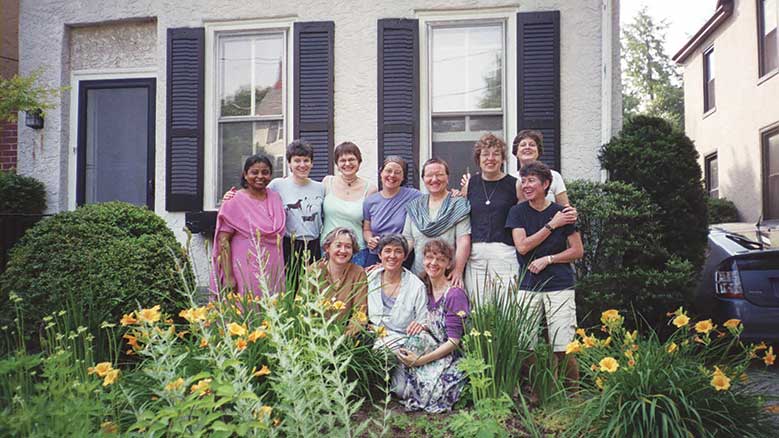God is mystery. The Divine is transcendent—bigger than our minds can comprehend, and also infinitely "other" than human. The Divine is also immanent—deep within us and amazingly familiar and accessible, as is our own deepest selves. The Religious Society of Friends is based on the assumption that this Divine Mystery connects with us individually and corporately. Virtually all faith traditions wrestle with the conundrum of how we humans can "know" this Divine Mystery. From our earliest days, Friends have assumed that all an individual can ever really know about God, about truth and love, about the Divine, is what he or she has actually inwardly experienced. It is an inward, intuitive knowing. For each of us, that is where we stand.
Quakerism has been called a mystical faith, and one definition of that involves having some sort of personal experience of the Divine. Such experiences vary widely, perhaps as widely as there are humans on Earth. Paradoxically, they also frequently fall into certain patterns. Some are vivid and immediately life-changing. Others are very subtle, so that the individual may not at first think there has been an encounter, and only in retrospect can one see that something has happened. Ultimately, it is difficult to speak of mystical experiences in ways that hold true for all. Trying to use our limited vocabulary to describe the tremendous variety of personal experiences can be even more difficult and downright stultifying.
Friends have assumed that it is the same divine source for all of these experiences. Friends then find unity not in the words describing the experiences, but in the experiences themselves. I have faith that your experience of the Divine is an experience of the same divinity that is the source of my experience. Friends also have faith that all together we can be united in the presence of the Holy One in a time of gathered worship or the hush of unity during a meeting for business.
Rather than trying to define "mystical experience," it seems more fruitful to look at the act of describing an experience. Because experiences of the Divine can be so personal, so powerful, so profound, they need to be deeply pondered. I believe that the human condition requires us to reflect deeply and frequently on any such experiences. Raw experience must be coupled with deep consideration in order to provide meaning. In order to think about something, we must put it into words or images. If we never think about it, never try to find the words or mental images by which we remind ourselves what has happened, then the experience dissipates over time. It loses substance and becomes ephemeral.
But there is an inevitable difficulty with putting an experience of the Divine into words. Words are human constructs that are intended to define, that is, they make something concrete and distinct. By defining something, by putting it into words, in effect we have some sort of control over it. We have decided that what we are describing is "table" and not "chair." But when we are trying to speak of God, we run into difficulty because God is bigger than our imaginations, bigger than our reason, bigger than our vocabulary, bigger than our minds. Trying to describe God, to define God, even to describe a mystical experience is inevitably and necessarily beyond the power of human words because words are of human construction, and God is not. So our attempts to speak of the Divine in our language inevitably fail. God cannot be captured in our word-boxes.
Another danger of trying to put our experience of the Divine Mystery into words, or metaphors, or poetry, is how easy it is to lose sight of what the words point to. We slip into the temptation to reify the images, to regard the words—such as "Father," "Light," or "Seed"—as concrete things. Then how easy it is to slide into the delusion that these specific words or images are all there is to be said about this reality, that they are the only reality.
Nevertheless, it seems to be part of the human condition that we must continue, Sisyphus-like, to try to put into words our experience of the Divine. If we do not try, the experience gradually dissolves; if we do try, we fail to convey the entirety of the experience.
Is this cause for despair? Not at all, but it is a basic reason for coming together as a faith community, and as a meeting. We need to tell each other our experiences of the Divine. We need to hear each other’s stories: each other’s fumbling words, images, and metaphors. Gradually, together we can build up a deeper understanding of the nature of God, and of divine relationship with human beings. Hearing other people’s experiences stretches our own imagination; it opens possibilities for us, and it enlarges our understanding of our own experiences.
For the first 150 years, Friends shared a common set of words, images, and metaphors, based on those in the Bible, to describe their experiences of the Divine. This shared language was like a code, or a shorthand. A single phrase would direct the listener to a specific story in the Bible, to previous messages in meeting for worship or in Friends literature, and—perhaps most importantly—to their own personal experiences understood through this lens.
Our branch of Friends no longer has a common language; in fact, some of us have prided ourselves on discarding it. One result is that each individual seeker feels free to pick and choose from any set of images, stories, or metaphors that appeal. There is no shared cultural baggage; each phrase can be heard as in a vacuum: clean, and without references.
While this can be considered an impressive gain, what we have lost is a sense of common purpose, of being gathered into one body with experiences rooted in the same Godhead. Another result is that many Friends are afraid to speak of their experiences because they fear that the words or metaphors in which they understand their own experiences will be unacceptable to others in their meeting. Some people are very shy of speaking about their experience of the Divine, for fear others will think they are crazy, or are boasting. There is also a hesitancy to speak of that which is so close to the heart, which means so very much, and which is so precious. So we do not speak of the single most important thing for a Friends meeting: we do not speak of our experiences of God.
One way out of this cul-de-sac is to agree on some ground rules to invite telling our spiritual stories. Friends might agree that each speaker is encouraged to use whatever words, images, and metaphors are most meaningful to her or him. Each person should use the phrases that best describe for him or her the experience, the understanding, and the truth. The burden of "translation" is on the hearer. All listeners are invited to do whatever contextual translating they require to make sense of what the Friend is saying. They do this translating silently, to themselves. They do not need even to say they are doing it.
If it seems too daunting to speak to the entire meeting of the ways the Holy One has personally touched you, it is often quite easy to gather a few folks who seem willing to experiment with such deep sharing. Nearly everyone who has tried it, that is, who has listened carefully to another Friend’s experience or had her or his own tenderly heard, reports being energized and drawn closer to the speakers and listeners. Meetings are greatly enriched by creating a climate in which folks are expected to speak of the way God moves in their lives. Isn’t this what the Religious Society of Friends has been about—being transformed by the Spirit, and witnessing to it?



